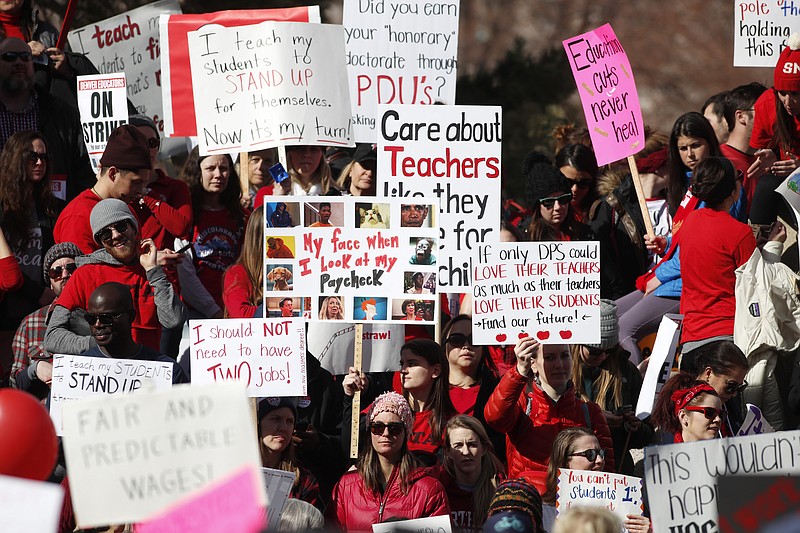DENVER (AP) — The union representing striking Denver teachers and school officials made progress Wednesday as they tried to reach a deal and end a three-day walkout.
By mid-afternoon, the negotiating teams had largely agreed on a proposal allowing teachers to more easily advance in pay based on experience, education and training. Weary negotiators, some with hoarse voices, joked about lack of sleep after talks ended amicably late Tuesday night.
They also have agreed to raise the starting teacher pay from $43,255 to $45,800, in line with the teachers’ union proposal and above that of some surrounding districts. According to the school district, some of the extra money being put into teacher pay will come from cutting about 150 jobs in the district’s central office and eliminating performance bonuses for staffers in the office.
School and union officials still must address a major sticking point: Bonuses for teachers in high-poverty schools and other schools the district prioritizes.
Lead union negotiator Rob Gould referred to the issue as “the elephant in the room.”
“We’re willing to entertain your ideas if we can get the base salary schedule that our teachers need,” he said.
Other teachers on the bargaining team said bonuses alone will not keep their colleagues at high-poverty and other priority schools, pointing to district data that showed a variety of teacher retention rates at those locations. They encouraged district officials to use other strategies, including smaller class sizes and better leadership, to keep teachers at those schools.
Superintendent Susana Cordova said she wants to have similar conversations about Denver’s schools with teachers “all the time.”
“Truthfully, there is so much that we agree on,” she said.
The district gives bonuses ranging from $1,500 to $3,000 a year to teachers who work in schools with students from low-income families, in schools that are designated high priority or in positions that are considered hard to staff, such as special education or speech language pathology.
The union is pushing to lower or eliminate some of those bonuses to free up more money that would be added to overall teacher pay. The sticking point on bonuses is how much extra to pay teachers who work in high-poverty and high-priority, which the district sees as a way to help improve the academic performance of poor and minority students
Teachers said the reliance on bonuses leads to high turnover, which they said hurts students, and that spending money on smaller class sizes and adding support staff, like counselors, is the best way to help disadvantaged students.
Reports from the school district indicate 58 percent of teachers did not report to work on Tuesday, slightly more than on the first day of the strike Monday.

